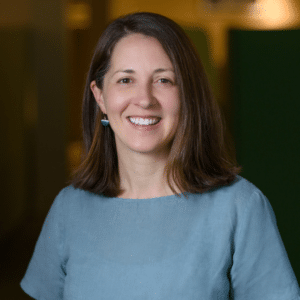Start Early Washington is fortunate to work with committed partners like Perigee Fund who believe in the power of healthy relationships with caregivers to give babies and toddlers the best start in life. Learn more about how Perigee Fund prioritizes investment in infant and maternal mental health in our recent conversation with Perigee team members Becca Graves and Kim Gilsdorf.

Perigee Fund: Giving Babies & Mothers the Best Start
Perigee Fund Executive Director Becca Graves and Program Officer Kim Gilsdorf share why an equitable start in life begins by supporting babies and their caregivers in establishing healthy relationships.
Stay Connected
Sign up to receive the latest early learning program and policy news in Washington state.

Looking for Bright Spots
What are some of the biggest things you’ve learned in supporting infant and maternal mental health?
Becca: I have been really impressed by the leaders that we have encountered in Washington State and across the United States. We all know there are not enough resources in the ecosystem to support families. We also know there is not enough support for the work that infant and maternal mental health leaders are doing. Yet so many leaders are willing to step forward with partners and make things happen. For example, Perinatal Support Washington and Start Early partnered to provide home visitors with Maternal Mental Health training. That partnership has created new mental health resources for the workforce and for families.

Kim: Because early childhood and parent mental health is so under-resourced, there are opportunities for progress in many kinds of systems. That is helpful because as we seek to fund systems change, we can remember we don’t have the answers. We can’t foresee which groups of stakeholders, in which systems, are going to rise to the occasion because they care deeply about the bond between caregivers and a child, and they see how important that is to their work.
In Tennessee we see leadership from community behavioral health, in California we see innovation led by pediatricians and community health workers, and in New Jersey there are doulas growing access to maternal mental health care. These examples are the tip of the iceberg. The diversity of ways to make progress is both a lesson learned as well as an approach we can continue to support.
Creating a Movement
(Start Early) Are you finding new champions for infant and maternal mental health emerging since Perigee began in 2018?
Becca: We have learned that there are champions everywhere. I think our mission calls us to learn about opportunities to help everyone see the importance of child and family wellbeing and valuing the earliest relationships. Particularly where there are instances of trauma in a family’s experience, either now or intergenerationally.
Whether it’s guaranteed basic income or child welfare, there are people in tune with needs and opportunities, and there are people who are curious and want to learn more. By gathering people together, getting to know one another, and talking about the issues, you can see the places where the family economic security goals and the mental health goals can come together and be in alignment.
When parents experience adversity, such as poverty, trauma and racism, their children can feel lasting effects, even into adulthood. Early support for babies, families, and caregivers can lessen the impact, leading to better long-term health and well-being.
Perigee Fund
Building for the Future
What would the biggest impact or change you would like to see over the next 10-15 years because of Perigee’s intentional investments?
Kim: I’d like to see policy makers have a greater understanding of the fundamental importance of early relationships. That mental model shift is part of creating policies that make mental health support more equitable and more accessible for families with very young children.
Becca: We need to value and embed support for families in the places where they are. Certainly, there are many ways that families support themselves and communities support families that don’t require additional resourcing, but they do require us to respect and value the importance of family relationships and community relationships and not get in the way. And there is a lot that we should be doing differently with our public policy and with the ways that we think about community-based models of care.
Supporting the Field
This is hard work and it’s not as easily measured as “can your child read by third grade.” Perigee has been such a champion in helping to advance our Neuroscience, Epigenetics, Adverse Childhood Experiences, Resilience (NEAR@Home) trauma-informed training to support home visitors in building a hope-focused approach when talking with families about trauma. It is also some of the most promising work we have for infant and maternal mental health. Can you tell us about why you chose to support NEAR?
Kim: NEAR does something with grace that is both important and difficult. It helps families and providers navigate difficult conversations about trauma, slowly and with compassion. Conversations about early childhood trauma can be very challenging for all involved, which is part of why many infant mental health professionals are invested in ongoing learning and reflective supervision. NEAR makes it possible to integrate some of that skill building and support into the job of being a home visitor. Regardless of their degree or education, all home visiting professionals trained in NEAR get the support they need to navigate hard topics with families and to do so with kindness and love. It is incredible!
Learn more about Perigee Fund’s priorities for Infant and Early Childhood Mental Health.
About the Author

Andrea Mackin
Assistant Director of Development and Communications, Start Early Washington
Andrea “Andie” Mackin leads Start Early Washington’s Development and Communications efforts across Washington state.
Washington State Hub
Learn more about our work in Washington state and access relevant resources and publications.
Stay Connected
Stay up to date on early childhood policy issues and home visiting programming in Washington state.
Resources for Professionals
From interactive courses to engaging events, we support educators in building powerful practices that transform teaching and learning.
